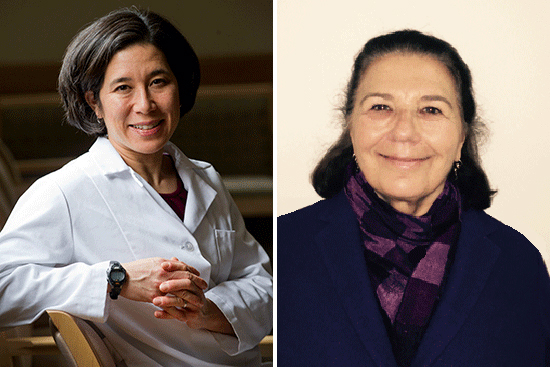Two from BU Cited for Encouraging Women in STEM
Lauded by magazine for their inspiration

Elise Morgan (left), a College of Engineering professor of mechanical engineering and of biomedical engineering, and Cynthia Brossman, founder and administrative director of BU’s Learning Resource Network (LERNet) are cofounders of BU’s Summer Pathways outreach program. Morgan photo by Cydney Scott; Brossman photo courtesy of Brossman
The average annual salary for someone working in science, technology, engineering, or math (STEM) fields in the United States is $85,570, nearly double the salary ($47,230) of the average American worker. But while women make up about half of the workforce nationwide, they hold only 25 percent of STEM jobs.
Two BU scientists who are working to change that number were recently applauded by INSIGHT into Diversity magazine—they made the magazine’s list of 100 inspiring women working in STEM fields in higher education. They are Elise Morgan, a College of Engineering professor of mechanical engineering and of biomedical engineering, and Cynthia Brossman (COM’94, SED’12), founder and administrative director of BU’s Learning Resource Network (LERNet).
Joyce Y. Wong, an ENG professor of biomedical engineering and of materials science and engineering, and director of BU’s Advance, Recruit, Retain & Organize Women in STEM (ARROWS) program, nominated Morgan and Brossman for the award. “I believe in what they do and I wanted to put a spotlight on their work,” she says. “The contributions and programs they have made require a lot of dedication, almost like a second job. It is great to see them recognized for their passion.”
As cofounders of BU’s Summer Pathways outreach program, which engages high school girls in a weeklong curriculum of science, engineering, and math, Morgan and Brossman often work closely together.
Morgan is director of the Orthopaedic and Developmental Biomechanics Laboratory. Her research focuses on the mechanical function of tissues and organs in skeletal health, repair, and development, and could eventually be used to pinpoint causes and treatments for osteoporosis, osteoarthritis, and poor bone healing. Morgan has also served on the steering committee of the science residence community WISE@Warren.
“I’m extremely honored to receive this recognition, particularly alongside people like Cynthia, who exemplifies tireless commitment to lighting a spark in the next generation of women in STEM,” Morgan says. “I always hope that I am making an impact through the research that my group does and by connecting with young people. It’s absolutely critical to help everyone around us understand the importance of STEM for society.”
A 23-year employee of BU and a winner of the University’s John S. Perkins Distinguished Service Award, Brossman has been involved with many programs that encourage young women to think about the STEM fields, including WISE@Warren, the Artemis Project, a BU computer science camp for 9th- and 10th-grade girls, and SET in the City, which introduces local high school girls to cutting-edge research happening in the city.
“What I like most about my job is being able to witness the transformation of some of the young women who participate in LERNet programs,” says Brossman, who also recently received the WEPAN Women in Engineering Initiative Award for her work with LERNet. “They not only become inspired to pursue STEM fields, but they become more empowered through these experiences. They gain more self-esteem and confidence in their abilities—and that often changes the goals they set for themselves.”
Mark Dwortzan contributed reporting to this story; he can be reached at dwortzan@bu.edu.

Comments & Discussion
Boston University moderates comments to facilitate an informed, substantive, civil conversation. Abusive, profane, self-promotional, misleading, incoherent or off-topic comments will be rejected. Moderators are staffed during regular business hours (EST) and can only accept comments written in English. Statistics or facts must include a citation or a link to the citation.